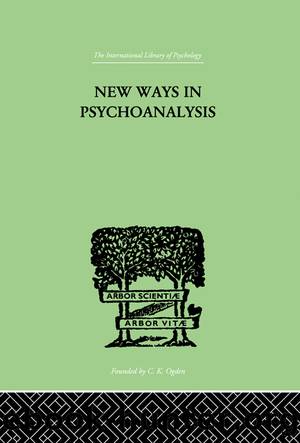New Ways in Psychoanalysis by Horney Karen

Author:Horney, Karen
Language: eng
Format: epub
Publisher: Taylor & Francis (CAM)
Chapter X
Culture and Neuroses
DISCUSSIONS in the foregoing chapters have shown certain limitations in Freud’s understanding of cultural factors, and the reasons for these limitations. I shall briefly recapitulate the reasons and summarize the influence which his attitude toward cultural questions has exerted on psychoanalytical theories.
We must remember first of all that the present knowledge of the extent and nature of cultural influence on personality was not available to Freud at the time he developed his psychological system. Besides, his orientation as an instinct theorist kept him from a proper evaluation of these factors. Instead of recognizing that the conflicting trends in neuroses are primarily engendered by the conditions under which we live, he regards them as instinctual trends which are only modified by the individual environment.
As a consequence Freud ascribes to biological factors the trends prevailing in the middle-class neurotic of western civilization, and hence regards them as inherent in “human nature.” This type is characterized by a great potential hostility, by much more readiness and capacity for hate than for love, by emotional isolation, by a tendency to be egocentric, ready to withdraw, acquisitive, entangled in problems concerning possession and prestige. Not recognizing that all these trends are brought about ultimately by the conditions of a specific social structure, Freud ascribes the egocentricity ultimately to a narcissistic libido, the hostility to a destruction instinct, the difficulties in money matters to an anal libido, the acquisitiveness to an oral libido. It is logical then to regard the masochistic trends frequent in modern neurotic women as akin to feminine nature, or to infer that a specific behavior in present-day neurotic children represents a universal stage in human development.
Since he is convinced of the universality of the role played by allegedly instinctual drives, Freud feels entitled to explain cultural phenomena too on that basis. Capitalism is seen as an anal-erotic culture, wars are determined by an inherent destruction instinct, cultural achievements in general are sublimations of libidinal drives. Qualitative differences in different cultures are accounted for by the nature of the instinctual drives which are characteristically expressed or repressed, that is, they are considered to depend on whether expression or repression concerns mostly oral, anal, genital or destruction drives.
It is also on the basis of these presuppositions that intricate customs of primitive tribes are explained as though they were analogous to neurotic phenomena of our culture.1 A German writer caricatures this procedure as the habit of psychoanalytical writers to regard primitives as a bunch of neurotics gone savage. Polemics arising because of such ventures into sociological and anthropological fields sometimes attempt to disqualify psychoanalysis altogether by pointing to the recklessness of its generalizations in cultural matters. This is not warranted. Such generalizations merely reflect certain debatable principles of psychoanalysis, and they are far indeed from the core of what psychoanalysis has to offer.
How little weight Freud ascribes to cultural factors is evident also in his inclination to regard certain environmental influences as the incidental fate of the individual instead of recognizing the whole strength of cultural influences behind them.
Download
This site does not store any files on its server. We only index and link to content provided by other sites. Please contact the content providers to delete copyright contents if any and email us, we'll remove relevant links or contents immediately.
Rewire Your Anxious Brain by Catherine M. Pittman(18630)
Talking to Strangers by Malcolm Gladwell(13338)
The Art of Thinking Clearly by Rolf Dobelli(10405)
Mindhunter: Inside the FBI's Elite Serial Crime Unit by John E. Douglas & Mark Olshaker(9308)
Becoming Supernatural by Dr. Joe Dispenza(8192)
Change Your Questions, Change Your Life by Marilee Adams(7727)
Nudge - Improving Decisions about Health, Wealth, and Happiness by Thaler Sunstein(7687)
The Road Less Traveled by M. Scott Peck(7581)
The Lost Art of Listening by Michael P. Nichols(7485)
Mastermind: How to Think Like Sherlock Holmes by Maria Konnikova(7312)
Enlightenment Now: The Case for Reason, Science, Humanism, and Progress by Steven Pinker(7303)
Win Bigly by Scott Adams(7181)
The Way of Zen by Alan W. Watts(6589)
Daring Greatly by Brene Brown(6497)
Big Magic: Creative Living Beyond Fear by Elizabeth Gilbert(5739)
Grit by Angela Duckworth(5591)
Ego Is the Enemy by Ryan Holiday(5406)
Men In Love by Nancy Friday(5225)
The Laws of Human Nature by Robert Greene(5153)
